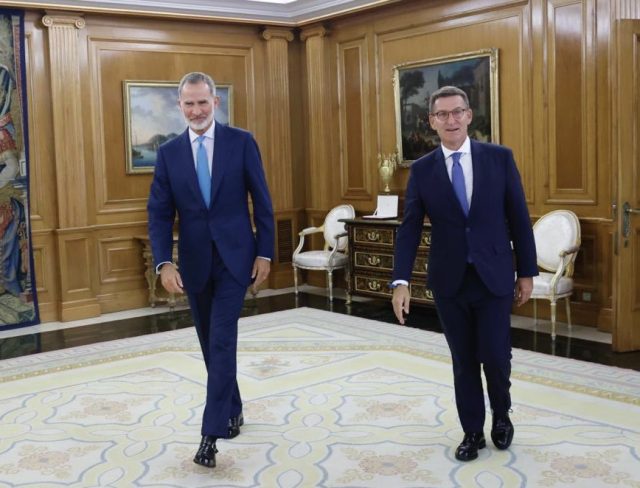
After the inconclusive national electoral results, and for the first time in history, Felipe VI had to choose between two party leaders with clear intentions to lead a new government: Alberto Núñez Feijóo from the centre-right Popular Party (PP, EPP), and acting Prime Minister Pedro Sánchez from the Spanish Socialist Party (PSOE, S&D).
King Felipe ultimately nominated Feijóo as his candidate for premier. Provided the candidate reaches the required majority of 176 votes in Congress, he will be named the next Prime Minister of the Spanish government.
The issue? Feijóo is still four seats shy of the required absolute majority. Analysts have even questioned his ability to gather enough favourable votes to win by a simple majority. This makes the path to governing neither clear nor straightforward. It might also provide the opportunity for a renewed left-wing coalition led by acting Sánchez.
The Royal Household understands the situation of instability. It acknowledged the King has selected the most voted candidate, Feijóo, despite the leader’s inability to gather the required 176 votes to form a government. The King’s Office released a statement explaining the Head of State’s decision follows the established “custom” whereby the most popular candidate is picked. However, establishing a government continues to be obscured by the fragmented and polarized state of Spanish politics.
For the moment, Feijóo only has 172 favourable votes—with the help of VOX, Coalición Canaria (CC) and UPN. Francisca Armengol, the newly voted president of Congress, has set the debate and vote to install a new government on the 26 and 27 of September. Observers expect Feijóo will try to woo the Basque Nationalist Party (PNV) despite their consistent refusals to support the centre-right leader.
This will give Feijóo little more than a month to gather the remaining four seats he needs. For now, leading member of PP, Esteban González Pons, has announced in an interview, that the party will try to negotiate “with everyone except EH Bildu,” the ETA-linked party. This includes Catalan separatist parties, Junts per Cataluya and Esquerra Republicana (ERC). However, he also made clear that “PP is not willing to do anything to govern, but it will try.”
For its part, left-wing parties have shown their discontent and apprehensiveness with the King’s decision. The left-wing party spokesperson for the Socialist Party (PSOE, S&D) in Congress, Patxi López, has assured that they accept any decision made by the King, but that it is undeniable that his choice will lead to a “ ‘fake’ investiture”. In his view, the establishment of a right-wing government is destined for failure, as Feijóo has shown itself unable to garner enough support: first, by failing to secure a majority in the elections; and second, the defeat of its candidate, María de la Concepción “Cuca” Gamarra, for the Congress’ presidency. Marta Lois, representative of its ally political party SUMAR, made similar allegations, affirming that Feijóo is “making us lose time”.
The road to forming a government is nothing short of tumultuous. There seems to be no end in sight. As it stands, a Feijóo-led government is no closer than on July 23rd.
If the result of the Congress’ Presidency is a sign, the most likely scenario seems to be that of a coalition government between the left, the regional-nationalists, and the separatists – what observers have referred to as the “Frankenstein coalition.”
The chances for a “Tamayazo”, a scenario where socialist MPs break away from the party’s direction and vote for Feijóo, does not seem likely either. This should not be automatically discarded, however, especially given the deal reached between the PP and the PSOE in the Castilla-La Mancha region.
Whatever the outcome, it is set to surprise many.



 Subscribe
Subscribe